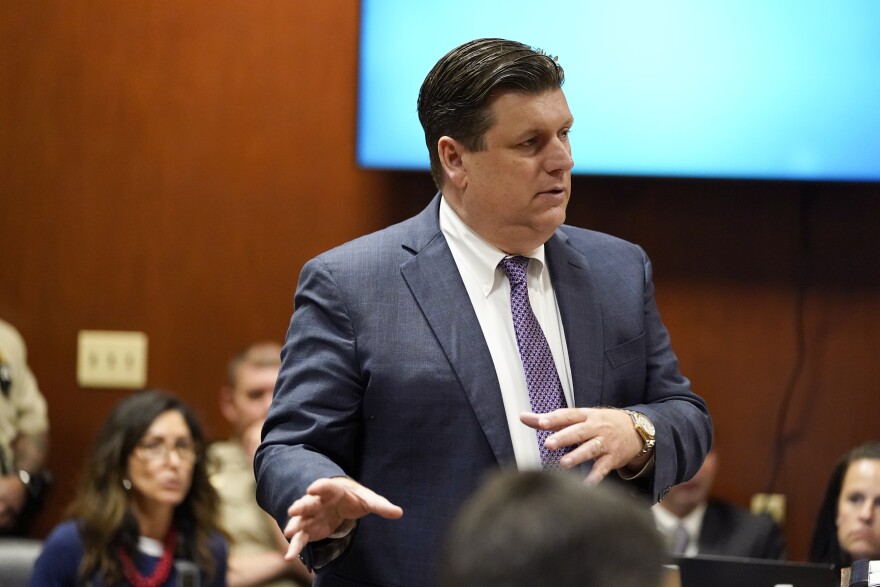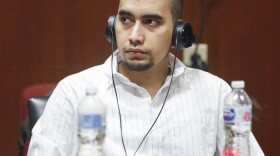Jurors have begun their deliberations in the case of Cristhian Bahena Rivera, who faces a first degree murder charge in the stabbing death of a University of Iowa student who went missing while on a run in 2018. Mollie Tibbetts had been known as a caring friend and a devoted daughter. Her disappearance prompted a massive search and drew national attention. Bahena Rivera has pleaded not guilty and took the witness stand to claim that it was two masked, armed men who abducted her and forced him at gunpoint to participate.
The jurors began their deliberations at the Scott County Courthouse at 1:30 p.m. on Thursday, the seventh day of the trial. They deliberated for three hours before being dismissed for the day and told to return Friday at 8:30 a.m. to continue their work.
Before being escorted to the jury room Thursday afternoon, jurors heard closing statements from both sides on their theories as to what happened to Mollie Tibbetts on the evening of July 18, 2018.
The day before, the jurors had watched as the defendant, a farm worker and undocumented immigrant from Guerrero, Mexico, took the witness stand and give his own testimony, a surprise development in a closely-watched case.
Speaking through an interpreter, Bahena Rivera claimed that on the evening Tibbetts disappeared, two unknown, masked men armed with a knife and a gun appeared in his trailer in rural Poweshiek County and forced him to drive them around, following Tibbetts as she ran.
He alleged it was these unidentified men who were responsible for Tibbetts’ death, who loaded her body in the trunk of his car, and who ordered him to drive them to a remote cornfield south of Tibbetts’ hometown of Brooklyn. Before running off towards a gravel road, Bahena Rivera said the men threatened his daughter and her mother by name, saying they’d “take care of them” if he spoke about the encounter.
Bahena Rivera admitted to placing Tibbetts’ body in the cornfield and covering her with cornstalks; he testified that he never told law enforcement because he feared retaliation from the masked men.

State dismisses Bahena Rivera’s testimony as “unbelievable”
Making his closing arguments Thursday, prosecutor and Assistant Iowa Attorney General Scott Brown lambasted Bahena Rivera’s account as unbelievable, presenting it as a fabrication concocted by a desperate man facing down a “mountain of evidence” that Brown says ties him to the crime.
“There weren’t two other guys. That’s a figment of his imagination,” Brown declared. “All of the credible evidence in this case, all of it, points at him.”
Brown sought to poke holes in Bahena Rivera’s account, arguing that the undocumented immigrant who doesn’t speak English should have felt safe enough around law enforcement to confide in them and request protection for his family.
Brown questioned why the masked men, who spoke English, would have chosen him, how they arrived at his trailer, and how they left the cornfield, running off and seemingly vanishing “into thin air."

Brown urged the jurors to stick with the evidence he had presented: household surveillance footage identifying Bahena Rivera’s black Chevy Malibu in the area where Tibbetts was thought to be running; his own admissions to law enforcement over the course of an 11-hour interview; and DNA evidence showing her blood was in his trunk.
It was during the hours-long interview, led by then-Iowa City Police Officer Pamela Romero, a native Spanish speaker, that officers say Bahena Rivera admitted to confronting Tibbetts on the road, getting angry with her, and then “blacking out," coming to later and placing her body in a cornfield. In the early hours of August 21, 2018, Bahena Rivera led officers to the field where her body was found.
“Looking at the evidence in this case, all of it, the video, the confession, the blood that’s in the trunk, all the other circumstances, all the other investigation that went into this, it all points to one person and one person only,” Brown said. “The truth here is overwhelming that the defendant murdered Mollie Tibbetts on July 18 of 2018. That the defendant committed murder in the first degree.”
Defense claims investigators “cut corners” in high pressure case
In his closing statements, an attorney for Bahena Rivera argued that investigators had been all too quick to believe that an undocumented immigrant was to blame, that they conducted at times “sloppy” police work, that they failed to fully vet the evidence or to fully examine other potential suspects, and that they closed the case prematurely under the weight of unprecedented public pressure.
“Imagine the pressure to put this case to bed. That's the context in which this arrest and this charge happened,” defense attorney Chad Frese said. “Some of the investigation was sloppy. But it really got sloppy when Cristhian Bahena Rivera got targeted. Because folks, what happened here was they closed the case. They didn't solve the case.”
Frese questioned why Romero, an officer with roughly two years on the job and 16 hours’ worth of training in interview techniques, would be marshalled to conduct an 11-hour interview with a homicide suspect in such a high stakes case.

He challenged why, with the “unlimited resources of the federal government” at their disposal, as one officer testified, did investigators not pull GPS phone records from Tibbetts’ boyfriend Dalton Jack, who had withheld information from law enforcement and given inconsistent accounts of where he was on the night of her disappearance.
Frese asked why officers didn’t conduct formal, recorded interviews with other men in the area known to be violent towards women, including Ron Pexa, a retired police officer whose property in rural Poweshiek County is adjacent to the cornfield where Tibbetts’ body was found.
Frese reminded the jury that other peoples' DNA, including male DNA, had been found in Bahena Rivera's trunk along with Tibbetts' and his own, questioning why investigators didn't submit samples from other potential suspects to compare the genetic profiles.
He questioned why investigators, bolstered by agents from the FBI and the U.S. Department of Homeland Security, equipped with helicopters and drones, were never able to locate a murder weapon or identify the primary crime scene in the case.
Ultimately, Frese argued that this violent act would have been completely out of character for his client, who he painted as a hardworking immigrant and family man with no history of violence. Frese said Bahena Rivera was focused on his work at a dairy farm where he labored some 75 hours a week, providing for his loved ones in the U.S. and at home in Mexico, and perhaps above all, keeping his head down.
“The undocumented immigrant who has spent years working in this country, working hard to remain undetected. Going to town only when necessary, working under an Anglo name “John Bud." Having no history of law enforcement contact, no known history of violence, is brazen enough to pick up a woman, abduct her and maybe kill her? In the span of 10 to 20 minutes?” Frese asked. “Folks, this was planned. But not by him. By someone else.”
Frese reiterated that it’s not his responsibility to prove who killed Mollie Tibbetts, saying that burden lies with the state. He argued that prosecutors have failed to do so beyond a reasonable doubt, urging the jury to acquit his client.
Jurors will return to the courthouse Friday morning to resume their deliberations.










